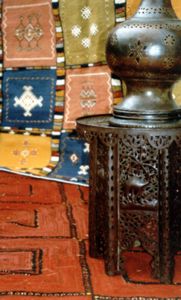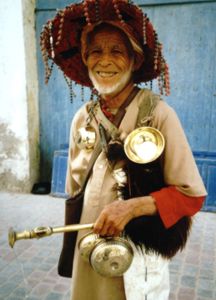Morocco: Travels With Hansi - Part 1
by
Cindy Thompson
Why Morocco?
My husband Alan, and I had driven East into India, now we were driving South into Africa? Our motorhome, a 22 year old 608D Mercedes, “Hansi” was certainly up to the job. The uncomplicated, German engineered 3.8 diesel engine built to last, meant that keeping Hansi on the road would not be a problem.
It seems that the most popular and easiest country in Africa to drive to, is Morocco. More than 25,000 motorhomes drove into Morocco during the year 2003/4 and the figure is increasing every year. For those who like to winter out of the UK, Morocco is very safe, affordable, friendly and accommodating to motorhomers. There are ample opportunities for those who love to wild-camp, as well as campsites for those who prefer to feel that extra piece of mind and security. The weather, especially along the southern coastal regions of Morocco is for the most part glorious. Expect to return from your winter in Morocco with an impressive suntan.
How To Get There
Getting to Morocco is easy. There are a number of ferry companies that operate from Spain and Gibraltar. We highly recommend sailing with STA, (Shipping & Transport Andalucia) a small company situated in Algeciras (Spain) J112 of the N340, behind the large Carrefour supermarket. All the staff were extremely helpful and friendly and we found their prices to be cheaper than any other company. They sail from Algeciras to Tanger. If you are UK based, STA will also arrange very affordable motor insurance for your stay in Morocco, which was more than could be said for my UK based insurance company who didn’t want to know! You can also buy motor insurance at the border and in Morocco, though you never know exactly how much it will be until you get there. During the crossing you must go and have your passport stamped with a visa, and collect a Temporary Import Duty document to complete in which your vehicle identity numbers must be penned. This is given to the customs officials as you enter the country, and you keep the white copy, which must be handed to customs when you leave Morocco.
Getting Through Customs
Much is written and talked about going through Moroccan customs. That you have to “bribe” customs officials to ease your passage through. We have driven through many borders, including Turkey, Iran, Pakistan, India and Nepal, and we didn’t “bribe” anyone, even though a couple of them threatened to “make problems” for us if we didn’t pay. We refused to pay, and they didn’t make any problems. Bribing customs officials in any country, is illegal and those that do, only make the problem worse for those that follow. Borders can be stressful, confusing and scary places. On the flip-side, they can also be archaic, amusing and interesting places. With queues lasting over four hours to reach customs, we had plenty of time to relax, talk to our neighbours, and sip a glass of sweet mint tea, brought to our door. Having said that, actually getting through customs took only 20 minutes, which compared to other countries, was very efficient.
Language
The official language of Morocco is Arabic. The Moroccans thought it was great that I could speak, read and write Arabic, so making myself understood was not a problem. The second most widely spoken language, is French. So if you concentrated on your French lessons at school (I didn’t) then you should be able to converse. Failing that, you will find that in most tourist areas, you will be able to use English, but it is well worth the effort of learning a few Arabic words. The further south you travel, the more predominantly Berber is spoken, which I found to be totally incomprehensible, even with my background of Arabic.
 Into Morocco
Into Morocco
The first thing that struck me about Morocco, was how green and fertile it was. I somehow imagined it to be mainly barren and desert. Morocco is the most mountainous country in North Africa, with an average altitude of 800 metres above sea level. As a country, it has something for everyone’s taste. From its deserts, hills, mountains and coastal plains, Morocco offers; surfing, walking, skiing, bird watching, football, fishing, golf, water sports, horse riding, and ample opportunity for bargain hunting and sight seeing.
The fishing port of Asilah on the north coast, provided our first pleasant break on our route south. A walled city with stone ramparts, with a busy but small market and long sandy beach, Asilah was a gentle introduction to Morocco. The parking attendant known to all as Sammy Davis Jr, spoke excellent English, was most helpful, and was a wealth of information on Asilah.
Essaouria
Now it is a very busy fishing port and a more salubrious tourist hangout. We stayedFrom Asilah, we drove down the coastal road to Essaouria passing some stunning views of the Atlantic coast. Essaouria (pronounced, Asor-weera) is a beautiful 18thC military port and in days past, was popular hippy town. The surrounding coastline is prime surfing waters, hosting national and international surfing contests. Essaouria not only attracts many foreign tourists, but also Moroccans for their annual holidays. Originally a Portuguese port, Essaouria was very important in ancient times due to a local shellfish from which a deep purple dye was farmed. at the campsite beside the lighthouse just outside Essaouria and with our mopeds, made light work of the 3 kilometre ride into town. Walking around the harbour fishermen can be seen unloading their catch, after which they busy themselves baiting the hooks for the next fishing trip. Some ancient looking boats in various stages of repair, being reconstructed using old methods can be seen on the quayside. Alongside the harbour, was the Moroccan equivalent of a fast food restaurant, displaying different types of fresh fish caught and unloaded just feet away that very morning. Out in the open air, underneath the sun, you are

encouraged to select the fish you want from a large platter. It is then whisked away, prepared, and barbequed or deep fried before your very eyes, then served as a delicious meal with salad, bread and drinks.
It was walking around the souk that we realised that we really were in Africa. All manner of items were on sale in the dusty, narrow, busy alleyways. Long flowing robes, camel leather slippers, drums carved of local wood, lanterns made of animal skins. Artisans busy beavering away on fragrant
thuya wood, could be heard fashioning an array of items, such as tissue holders, coasters, chess sets, and boxes. Tailors with whirring sewing machines surrounded by heaps of material and hanging lengths of cloth would, if you asked, create made to measure Moroccan fashions while you waited. In the food souk you could buy an array of spices, fruit and vegetables, and you could even buy Viagra!
On our last visit to the souk, a funny thing happened. We were grabbed by the wrist by a rather handsome young blue robed desert man. ‘Come see Picasso carpet.’ We didn’t really want to but it seemed we had little choice. We were seated in a small shop on stools, where we passively watched the blue robed man pile carpet after carpet on top of each other in the middle of the room. Omar spoke very good English. ‘Look you can put fire to the carpet,’ as he touched the carpet with the flame of a cigarette lighter. ‘but it doesn’t burn. With not a fire extinguisher in sight and the carpets piled strategically between us and the exit, it was a worrying situation. You can also scratch it and it doesn’t wear.’ Thankful that he had put the cigarette lighter away, I feebly protested, ‘But we don’t want to buy a carpet.’ Omar had selective hearing and continued to pile an appreciable mountain of very nice Picasso carpets in front of us. I was getting rather concerned that we would soon disappear under this sea of carpets, never to be seen again. I sat visualising the headlines in the newspapers. Innocent Tourists suffocate under a sea of carpets! Eventually he realised that we were not going to buy a carpet, so asked us to come and see him and his brother play some desert music. Thankful to get away from the carpets, we agreed. What followed was a brilliant drumming session. Omar and his brother were fantastic tom-tom players, their fingers were so fast and created so many rhythms. I was rather spell bound. Two hours later, we were at last free to go and explore the rest of the souk, though not without an invitation to visit Omar’s village in the far eastern desert of Morocco on the Algerian border.
Yes, the Moroccans were very friendly, and made us feel most welcome, but as we were to find out, Morocco was also full of surprises.











